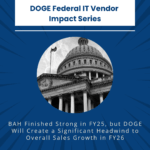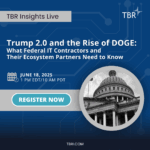Data Quality & Governance Pillars, and Ecosystem-led Approach Mark Informatica’s Entry Into Agentic AI
Building on last year’s theme of modernization, where Informatica highlighted innovations to fast-track migrations from legacy PowerCenter and Master Data Management (MDM) to Informatica Data Management Cloud (IDMC) in the cloud — accounting for over half of Informatica’s business — Informatica World 2025 in Las Vegas was all about agentic AI, and the crucial, yet still sometimes overlooked, role of data. With its ability to apply reasoning to handle more complex, multipart workflows, agentic AI has rapidly emerged as AI’s next frontier. Although agentic AI promises increased productivity, AI agents require a few key elements, including orchestration, a vast knowledge base and governance. With the wealth of metadata in CLAIRE, the AI engine powering IDMC, it was only a matter of time until Informatica used some of its core differentiators to push into the agentic AI space to not only craft a future for more autonomous data management but also to give customers the tools needed to build and orchestrate their own agents.
Informatica enters agentic AI race
Informatica employs two strategies relative to generative AI (GenAI): Informatica for GenAI, in which customers use IDMC’s data management capabilities to enable enterprises’ GenAI use cases; and GenAI from Informatica, where customers leverage Informatica’s GenAI offerings. Those products include CLAIRE Copilot, which entered general availability at the event, and CLAIRE GPT, which is used by over 550 clients to streamline tasks within IDMC such as pulling datasets and interacting with catalogs. On the annual conference’s 25th anniversary, Informatica formally entered the agentic AI space with a similar approach, giving customers the ability to consume AI agents within IDMC for more autonomous data management and a tool for letting customers build, manage and orchestrate their own AI agents.
- CLAIRE Agents: As part of the GenAI from Informatica strategy, Informatica introduced eight new agents to support tasks across the data life cycle. The agents, which are expected to begin preview in 2H25, are Data Quality, Data Discovery, Data Lineage, Data Ingestion, ETL [Extract, Transform Load], Modernization, Product Experience and Data Exploration. Architecturally speaking, these agents will round out the IDMC platform, sitting above the metadata system of intelligence, with CLAIRE Copilot and GPT acting as user experience (UX) overlays, where customers can interact with these agents.
Nearly every facet of IT has emerged as a prominent use case for GenAI, including data management, and customers are looking for ways to streamline more system-level tasks. Provided customers are prepared to move from manual — or even predictive and conversational AI engineering — to agentic AI, these new data management agents can help absorb a lot of back-end data management tasks, including developing the data pipelines and reducing some of the burden on the user, whose primary focus now becomes managing the agents.
- AI Agent Engineering: In agentic AI, the hyperscalers and SaaS vendors are racing to position as the AI control tower. As more vendors push into the PaaS space and the resulting AI agents convolute the applications layer, the question becomes, “Which set of vendors are positioned to abstract that complexity in a governed way?” At the event, Informatica entered the space with the introduction of AI Agent Engineering, a new tool to help users build their own agents using the popular low-code/no-code drag-and-drop experience. Additionally, AI Agent Hub, which acts as a marketplace within AI Agent Engineering, helps users find, manage and connect these agents, including not just Informatica’s CLAIRE agents but also the tools customers are already using to build agents, such as Amazon Bedrock, Azure OpenAI, Google Vertex and Salesforce’s Agentforce. When it comes to building and orchestrating AI agents, customers have a range of options, but one of the compelling things about Informatica entering this space is its ability to provide the federated governance and access controls around these agents without disrupting existing workflows. Governance remains one of the leading barriers to GenAI adoption, and while some overlap will always exist between the hyperscalers and data ISVs, the hyperscalers recognize Informatica’s reputation for helping customers build trust in their data and ability to apply that trust in a vendor-agnostic way.
Unlock the potential of generative AI (GenAI) in your enterprise by understanding the critical role of unstructured data management – Watch The Emerging Data Ecosystem on demand now
Ecosystem developments
As we often discuss, Informatica maintains a high degree of neutrality and can effectively work across a range of technology partners without introducing significant overlap. Maintaining its commitment to working within the technology ecosystem, Informatica announced new product integrations across its technology partners, including the following highlights.
- Microsoft: Microsoft’s play at the PaaS layer (e.g., Synapse, Power Platform) and ability to extend the Dynamics 365 data model to enable Customer 360 analytics make it an invaluable, somewhat unique partner to Informatica. Reaffirming Informatica’s commitment to Microsoft, CLAIRE Copilot was built using the Azure OpenAI Service. The launch of Microsoft Fabric last year seemed to mark a turning point in the alliance, as Informatica was granted status as an early design partner for Fabric, which has amassed 21,000 paid customers in the span of 18 months. Essentially, this status allows Informatica to make its Data Quality tool available as a native service, so customers can profile and assess data using Informatica as it gets ingested into Microsoft Fabric via the OneLake repository in real time. At the event, Informatica made Data Quality available (in public preview) as its own Fabric application. In addition, as part of its commitment to staying relevant within the Microsoft Fabric ecosystem, Informatica will start supporting Apache Iceberg in Microsoft Fabric, which is important as Microsoft looks to cement its commitment to open standards. These developments come as part of a new strategic agreement between Informatica and Microsoft, which implies not just a focus on R&D but also investment in the joint go-to-market approach. Having Informatica exist as a first-class citizen within the Microsoft stack could make the case for customers to explore other components of IDMC, creating deeper synergies with services partners like KPMG that use Informatica and Microsoft Fabric, both internally and externally for data modernization and transformation.
- Salesforce*: Though Informatica and Salesforce technically had a preexisting alliance, the partnership was formalized at Informatica World 2025 with the announcement that IDMC will be integrated with Salesforce’s Agentforce. Specifically, Informatica plans to deliver MDM SaaS with Agentforce, effectively putting the 360-degree wrapper around agents that customers build in Salesforce’s platform. As previously mentioned, customers will also be able consume Agentforce via Informatica AI Agent Engineering upon availability later this year. Salesforce sees Informatica as a key player in the market and is looking to strengthen its play in data management and governance in accordance with Agentforce, so this partnership is a win for Salesforce. In turn, Informatica seems to recognize the role Agentforce will play in the AI ecosystem for sales and service use cases, and it will be interesting to see how this partnership progresses and if Salesforce ends up joining Informatica’s seven other, more established technology partners.
On the services side, Informatica continues to cement its value across nine core global systems integrator (GSI) partners, which collectively staff 30,000 Informatica professionals. In 2024, Informatica earned 15,000 certifications, up over 20% year-to-year. Vendor sentiment and our own conversations with enterprise IT decision makers suggest that for AI to effectively scale, data needs to be in the cloud. As such, modernization will continue to be a big focus for Informatica and its partners through 2025. This includes AI-powered modernization and potentially using the new CLAIRE Agents, specifically Modernization, to help migrate on-premises data to IDMC. When it comes to agentic AI, Informatica’s new innovations should open new doors for services partners to not only modernize data management tasks ahead of GenAI deployments but also help clients create new custom agents (using AI Agent Engineering), including those tailored to certain industries, and make them relevant within existing workflows.
Between the technology partners and GSIs, Informatica works with a robust ecosystem of partners in a triparty approach, where resources from a hyperscaler, GSI and Informatica are brought together to help customers modernize their data faster and, by default, hasten AI’s time to value. When we survey and speak to alliance decision makers at IT services firms, data management comes up as one of the top areas for partner-led growth, signaling to the ecosystem that they will continue to invest in resources to guide conversations with customers with the technology maturity to address the data foundations ahead of GenAI.
Conclusion
Agentic AI has a lot of promise but also some challenges. The proliferation of AI agents will create more best-of-breed complexity — which we know customers are trying to move away from — and heighten concerns around data privacy and governance. Informatica’s move into the agentic AI space with both CLAIRE Agents and AI Agent Engineering is certainly in step with the market; we all know AI agents do not exist in silos, so Informatica’s ability to work within its ecosystem of tech partners and connect agents in a vendor-neutral way is particularly compelling. Meanwhile, Informatica’s robust engineering relationships with the hyperscalers, as evidenced by Informatica’s Data Quality integration with Microsoft Fabric, will continue to elevate its standing with the big GSIs and foster a compelling triparty alliance approach focused on helping customers get their data ready for AI.
*After Informatica World, on May 27, Informatica entered into an agreement to be acquired by Salesforce. Informatica will continue to operate as a stand-alone entity until the acquisition closes, likely in Salesforce’s FY27. Please see TBR’s Salesforce coverage for further insights.

 Getty Images Signature
Getty Images Signature Technology Business Research, Inc.
Technology Business Research, Inc. Technology Business Research, Inc.
Technology Business Research, Inc.